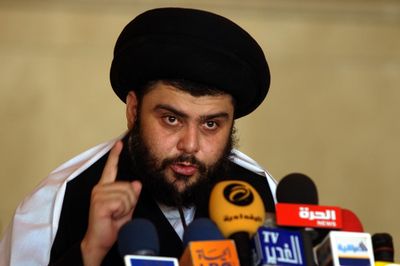Iraq’s al-Sadr plans to make Iran his home base for years
Decision may mean his focus is religion, and not violence

NAJAF, Iraq – Militant Shiite leader Muqtada al-Sadr plans to make a series of short visits to Iraq starting within weeks but has decided to make Iran his home base for years to come, a key aide says.
The aide spoke on condition of anonymity because he was not supposed to discuss the subject. He is close to the 35-year-old cleric and has accurately reported on the Sadrist movement for several years.
The aide would not say how long al-Sadr would stay in Iran, where he has lived since May 2007, but said it was “reasonable” to expect he would remain there for five or more years.
That’s the time al-Sadr needs to prepare to win acceptance as a “marjaa,” joining Iraq’s top Shiite leader Grand Ayatollah Ali al-Sistani and three other grand ayatollahs as members of the highest Shiite religious authority.
Al-Sadr announced in March that he had moved to the Iranian holy city of Qom to focus on religious studies – an essential credential for power in Iraq’s majority Shiite community.
The decision to extend his stay could indicate the cleric, whose Mahdi Army militia battled U.S. and Iraqi forces for years, has decided his future lies in politics, not violence.
Last month, al-Sadr announced he was transforming his militia into a social welfare body with a few guerrilla cells to attack U.S. troops if Washington doesn’t agree to leave Iraq. The announcement followed setbacks in battles with the U.S.-supported Iraqi army in Baghdad, Basra and Amarah.
The decision to stay in Qom could also be part of a move by Iran to control Shiite resistance in Iraq. The U.S. military believes Iran arms and trains breakaway Mahdi Army cells, a claim the Iranians deny.
“He is the guest of the Iranian government who will control him … until such time they have comfortably wrested control of the Mahdi Army away from him,” said Vali Nasr, a U.S.-based expert on Shiite affairs.
Nasr said talk of remaining in Iran for studies or other reasons may be “grandstanding and face-saving talk,” suggesting that al-Sadr may not be free to leave.
But al-Sadr’s aide said remaining in Iran would allow al-Sadr time to pursue his religious education beyond what he needs to become an ayatollah. Al-Sadr expects to reach that goal in 2010, the aide said.
Al-Sadr realizes it will take longer for him to win a place at the top of the Shiite clerical hierarchy in the holy city of Najaf – the world’s foremost seat of Shiite learning. Najaf’s religious establishment is often hostile to newcomers, and money and political connections count nearly as much as scholarship and piety.
Al-Sadr’s quest for clerical eminence is likely to rattle the Najaf religious establishment – immersed in centuries-old traditions and unfamiliar with his mix of street politics, social outreach and violence.
His ambitions may be unrealistic. Even the cleric’s aide and a Sadrist lawmaker acknowledged that for al-Sadr to succeed, he must overcome a number of hurdles, including al-Sistani and rivals in the Supreme Islamic Iraqi Council – the country’s most powerful Shiite party.
However, al-Sadr’s quest may be backed by some in Iran’s Shiite clerical hierarchy who are grooming him for leadership.
Two clerics supervising his studies are key Iraqi-born figures in the Iranian clerical establishment – Grand Ayatollah Kazim al-Haeri and Ayatollah Mahmoud al-Hashemi, the head of the Iranian judiciary.
Al-Sadr comes from one of Najaf’s oldest religious families. His father, Grand Ayatollah Mohammed Sadiq al-Sadr, was gunned down by suspected agents of Saddam Hussein in 1999 along with two sons.
Muqtada al-Sadr’s wife is a daughter of Grand Ayatollah Mohammed Baqir al-Sadr, a distant relative of his father and one of Shiite Islam’s most prominent theologians. He was tortured to death in 1980 by Saddam’s agents.